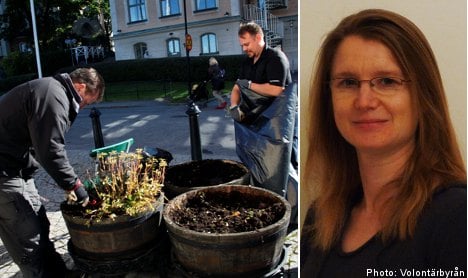UK-native Claire Thomas, who recently launched The English Volunteering Project in Stockholm, has volunteering in her blood.
Coming from an English family which has been involved with volunteering “for generations”, she claims that helping people is part of her life.
When she found herself in Sweden in 2010, thanks to her husband’s new job, it wasn’t long before she started scouting for volunteer opportunities on Swedish shores, but the initial searching proved fruitless.
“I realized fairly quickly that while Sweden does already have a great volunteer recruitment agency, the “Volontärbyrån”, there was no real opportunity to sign up and help if you were an English speaker,” she tells The Local.
At least not then.
After noting the interest and potential for English-speaking help around Sweden, Thomas proposed a collaboration with the Volontärbyrån – to add an English recruitment section to their website, and has since got the go-ahead for the project, dubbed The English Volunteering Project.
Thomas claims the concept will be a great way to help ease some of the initial challenges associated with moving to a foreign country.
“It can be hard to find any kind of work here when you don’t speak Swedish, and it’s often tough to meet people. When you can tick off these kinds of boxes, while at the same time giving much needed help, the experience can be really rewarding,” she explains.
However, many foreigners miss this opportunity due to not speaking enough Swedish to learn about or meaningfully engage in existing volunteer opportunities.
And while while some expats have gotten the impression that this means Sweden is simply not interested in getting help, that is not the case at all, according to Thomas.
“It’s just a matter of accepting that Sweden is different, in a good way. Many people don’t talk or brag about their contributions to non-profit organizations like they might in other countries,” she says.
“Volunteering in Sweden can seem invisible, but it really isn’t. There is a whole different culture behind the volunteer sector, but this is not a worry – it just means things need to be negotiated differently”.
And this is where Thomas steps in.
The English Volunteering Project is now well on the way to becoming a reality, and already has Prince Charles’s seal of approval, which he personally gave Thomas during his recent visit to Stockholm.
“He told me thought it was a brilliant idea – which was really encouraging,” Thomas says.
Vanja Höglund, spokesperson for Volontärbyrån, has big expectations too, claiming that the possibility of engaging English speakers with Swedish society is an opportunity that’s too good to miss.
“It’s incredibly nice when you hear of someone who wants to contribute their time commitment, and of course we want to be able to take advantage of that commitment,” Höglund tells The Local.
“Our vision at Volontärbyrån is that everyone who wants to be able to find a volunteer assignment that fits them will be able to, and if we can reach even more people with an English translation of the service, then we’ve succeeded with our mission.”
But it has been a long road, which started in November last year, and has occupied Thomas while juggling her first pregnancy.
However, Thomas is keen to get the project through the final stages so that it’s up and running before her baby is.
“We hope to be able to work on the English web section on Volontärbyrån in June, with the Project coming into full swing in September or October,” she says.
Now all that’s missing is the funding that will allow the creating of the English sub-section.
While interest in the project may be sky high, more donations are still needed before it can be created and officially launched online.
To achieve this, the Project is setting up an account with “Funded by Me”, an online crowd-funding programme, in which people can donate to the project through a web-based social media platform.
The account will be launched in a matter of weeks, according to Thomas.
In the meantime, Thomas is still working hard on the project and volunteering in her spare time, but is keen to point out that volunteering is a two-way street where everybody can gain something positive.
“I love volunteering, but it’s not just about giving. In fact, volunteering has actually given me quite a lot. It’s been a way for me to take the focus off myself when things haven’t been easy,” she explains, adding that her work on this project is completely voluntary as well.
“Volunteering enriches your life, and helps others at the same time. Hopefully English speakers in Sweden can jump on board and help get this project going.”
UPDATE: Click here for the The English Volunteering Project donation website



 Please whitelist us to continue reading.
Please whitelist us to continue reading.
Member comments